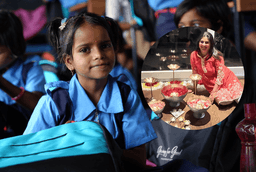

- 27 Sep 2021

When you think about your child's future, don't you always picture a good person, who is happy, successful, and winning at life? All parents do.
Lately, there has been an addition to this list. People want to raise children who are kind and value the feelings of others. At times we confront distress and pain in the outside world, and it is human nature to reflect upon our own lives for clarity and solutions. Some worry about teaching kindness, for it could cause the child to lose his/her edge in this competitive world, but it is a quality the world needs now more than ever. As Harold S. Kushner once said, "Do things for people not because of who they are or what they do in return, but because of who you are."
Here are simple methods to teach children the importance of kindness:
Gratitude is an emotion that is gentle, yet bold. It is looking at the bright side, focusing on the lesson learned instead of flinching at the tiniest of inconveniences. The first and most important step towards being kind is understanding and practicing gratitude. Children who are grateful for their family, friends, surroundings, and people around grow up to be humble adults who understand empathy.
Kindness does not cost a penny and hence must be sprinkled around the world like snow. Random acts of kindness help children observe and understand the importance of being kind towards one another. Remember, children imitate what they observe. When they see you helping the needy, feeding a stray animal, or simply being patient with the barista, their tiny (and powerful!) minds capture your actions and reactions for the future. Perform random acts of kindness, especially when your child is around to witness, as it is the most effective way to model kindness.
Help your child understand the positive effect of being kind when he/she is young. It has an impact on their state of mind, and needless to mention, on the mind of the giver. Perform this exercise next time you're waiting in line with your child. Simply ask the person behind you to step ahead in line. Let your child observe and ask why you did so. If your child is distracted, ask him/her what he/she thinks of your small gesture. The person who stepped ahead is likely to smile and thank you, and that's the goal, right? Every act of kindness comes with positive effects and letting children witness for themselves will help them understand why it is so important to be kind.
Help your child understand the difference between being rude and being nice. Often, children unknowingly say things out of the blue, unaware of the consequences of their words/actions. In situations like these, it is essential to hold your child accountable and teach him/her to value the feelings of others. A simple exercise is switching roles. How would you feel if the person you were rude to said/did the same thing to you? Not very nice, right? Help place your child in the shoes of the person he/she was rude to, and further encourage him/her to apologize. Empathy comes with understanding and valuing the feelings of others and holding a child accountable makes him/her aware and conscious of what he/she says. This is a great method to help your child stay grounded and kind.
We often treat kindness as an action that must be appreciated and rewarded. In reality, kindness is close to selflessness. Children should be encouraged to do the right thing and choose the right path without expectations for rewards. Encourage conversations when you practice kindness in small ways. Ask your child what he/she thinks of these acts. Question them. What do I receive when I smile at the newspaper boy? When I refill the birdfeeder? When I help an old man cross the road? Generate curiosity in the mind of your child and then fill in the gaps. It will help them grow up to be better and softer human beings who understand that the smile on the receiver's face is the greatest reward.
Experience is the best teacher - this is one life lesson that most of us believe in, and the same applies to raising children who are kind. They learn through positive reinforcement, and so the key is for adults to serve as role models. Helping your child value others builds a strong foundation for empathy. In a world full of distress and loneliness, let's raise a generation that does not hesitate to lend a helping hand. We aren't always aware of the battles people face in their everyday lives. So, choose kindness, it may just make someone's day!

Sakshi dreams of writing a gripping murder mystery – unless she’s creating content and building the Giving for Good brand. She’s a tennis player, a swimmer, a crime fiction enthusiast, and a twenty-something-year-old who enjoys volunteer work.